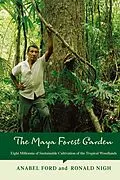The conventional wisdom says that the devolution of Classic Maya civilization occurred because its population grew too large and dense to be supported by primitive neotropical farming methods, resulting in debilitating famines and internecine struggles. Using research on contemporary Maya farming techniques and important new archaeological research, Ford and Nigh refute this Malthusian explanation of events in ancient Central America and posit a radical alternative theory. The authors-show that ancient Maya farmers developed ingenious, sustainable woodland techniques to cultivate numerous food plants (including the staple maize);-examine both contemporary tropical farming techniques and the archaeological record (particularly regarding climate) to reach their conclusions;-make the argument that these ancient techniques, still in use today, can support significant populations over long periods of time.
Autorentext
Anabel Ford is director of the MesoAmerican Research Center at the University of California, Santa Barbara, and President of the nonprofit organization Exploring Solutions Past: The Maya Forest Alliance. She has done extensive research on patterns of Maya settlement and landscape ecology, and is recognized for the archaeological discovery of the ancient Maya city center of El Pilar, on the border of Belize and Guatemala.,
Ronald Nigh is a professor at Centro Investigaciones y Estudios Superiores en Antropología Social (CIESAS) in Chiapas, Mexico. He is the author of numerous studies and articles on agricultural, ecological, and environmental issues of concern to indigenous peoples in Mesoamerica. He is also director of Dana, a non-government organization that coordinates an experimental garden in San Cristobal de Las Casas for training and support of young Maya farmers involved in agroecological transition.
Inhalt
Introduction Prosperity across Centuries; Chapter 1 The Context of the Maya Forest; Chapter 2 Dwelling in the Maya Forest: The High-Performance Milpa; Chapter 3 Environmental Change and the Historical Ecology of the Maya Forest; Chapter 4 Maya Land Use, the Milpa, and Population in the Late Classic Period; Chapter 5 The Forested Landscape of the Maya; Chapter 6 Maya Restoration Agriculture as Conservation for the Twenty-first Century;
